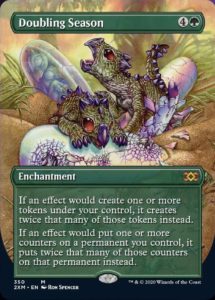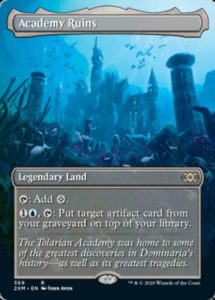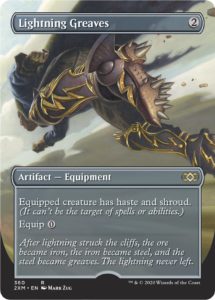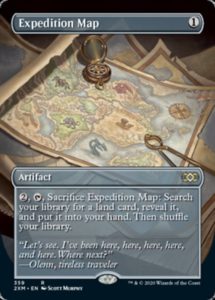Double Masters releases on Magic Online this Friday. When a set is three days from release, we always have a complete set spoiler. By this point, I would have pored over the cards to create a draft guide here or, if I’m shorter on time, craft an informal guide for friends.
This time, we won’t know the full set until the day before it’s playable. Moreover, at time of writing, we only know eleven commons. With most previews focusing on rares, mythics, and box toppers, there’s scant insight into the archetypes and common card interactions of the first artifact-focused Masters set. There’s just not enough data to guess what an average draft deck will look like.
A Different Kind of Masters?
I love Limited. Five, six times a year, we’re presented with this puzzle to solve—how is this format different from all others formats? How is it similar? What old knowledge might lead us astray and what might give us an edge? Masters sets rank among my favorite, since they have high power levels, high synergy, and recontextualize familiar and often beloved cards that might otherwise not see play. I was saddened by their decline in quality and eventual sunsetting, but Ultimate Masters was an outstanding way to conclude. Their reintroduction after a two year hiatus was absolutely welcome.
However, Double Masters elicited a wholly unfamiliar emotion in a Masters spoiler season—boredom. With the spotlight almost exclusively focused on desirable rare reprints, even more desirable alternate art box toppers, and how they justify its price point; it seems like the Limited format either isn’t expected to drive excitement or may well not be something they’re proud of. As someone who loves Limited, this is disheartening.
Changing Times
Double Masters not being Limited-focused could be a sign of the times. After all, Mark Rosewater just penned a special weekend article not to build hype for Zendikar Rising or the Players Tour Final, but to announce a third line of booster packs meant to be cracked, not played with. Perhaps Double Masters is just a product of this era, where the gambling game of cracking packs is just how Magic makes all its money and we cut out the middleman of draft entirely? That’s a cynical position, and an unfair one at that. The actual answer is pretty obvious.
Magic is adapting to fit the bizarre, scary, and temporary rules of today. In normal times, I’d be registered for release weekend Double Masters drafts at my local game store. I’d have preordered a box and invited over friends to prepare for the Double Masters Grand Prix Vegas later this month. But it isn’t safe to congregate for Limited events. Instead, the only way to safely draft Double Masters is on Magic Online, a strong platform with a tiny audience compared to Magic Arena’s.
Circumstances are likely to make Double Masters the least played Masters set ever, regardless of its quality. It makes perfect sense for Wizards to focus its marketing on players who want reprints for Commander decks they play remotely with friends, or who are building up collections for when the global pandemic ends, or who enjoy owning extra premium cards. Those are the people who’re going to drive sales—Limited-focused players like me might buy a box, but we’re probably not going to commit to loads of Sealed product without getting to play with it.
The Importance of Being Agile
Over the past year, Magic has added a slew of new product lines. These mostly target underserved audiences and generally aren’t for me. Change is scary, especially for something like Magic, which has been part of my life for the past twenty-six years. It’s hard when a company that previously designed a majority of its products for people like me doesn’t anymore—even though this change is entirely due to expanded product lines, not the removal of anything meant for me (other than Masters sets, which are now unretired). Yes, the existence of VIP boosters, a super-premium version of a premium product line is complicated, and that’s before acknowledging that Double Masters already has the highest price of any Masters set. But Magic has been experimenting and expanding, two factors that likely improve its changes of emerging from the pandemic in a strong position.
By expanding its audiences and product lines, Magic diversifies its player bases and is better able to weather shocks like Covid-19. While I might normally be a more profitable-than-average player, right now I’m far from being within Magic’s most important base. Sure, I play a lot of Arena and still purchase boxes from my local game store, and I think Set Boosters might be the perfect thing if I’m just buying boxes to crack; but as far as Double Masters is concerned, I can’t draft, I have no need of a Constructed deck for the foreseeable future (and therefore, don’t need reprints), and I’m in no rush to update my cube that I have no one to play with (and so will likely wait on getting new foils or box toppers).
Magic’s marketing not focusing on Double Masters’ Limited format isn’t a sign of weakness in the product, it’s a sign that Limited can’t be a primary way people engage with it because congregating isn’t safe.
Biding Time
Before Covid, I certainly wasn’t enamored of Secret Lairs, how so much of Organized Play moved to Magic Arena, and how Commander seemed to have changed so much of how Magic designs all of its sets. Right now, those changes seem almost prescient.
Imagine riding out the pandemic where Magic Online is the best and only digital implementation of Magic, where the MOCS and PTQs are the only precedent for big digital tournaments. Imagine if Magic didn’t have robust communities of Commander players playing remotely with each other on the internet and delighted by box topper versions of Lightning Greaves and Avacyn, Angel of Hope. Imagine if Magic didn’t have simple, profitable product lines like Secret Lairs to keep them solvent and if they hadn’t created Jumpstart, the perfect product for playing Limited with just two people.
Right now, I’m thankful for those other products, even though they aren’t for me. They make it more likely that when the crisis ends, I’ll be able to go to my local game store, sign up to draft the next Masters set, and keep playing the game I’ve loved since childhood—even if I can’t play it the way I want to or as much as I want to right now.
And, as always, thanks for reading.
—Zachary Barash is a New York City-based game designer and the commissioner of Team Draft League. He designs for Kingdom Death: Monster, has a Game Design MFA from the NYU Game Center, and does freelance gatame design. When the stars align, he streams Magic (but the stars align way less often than he’d like).





